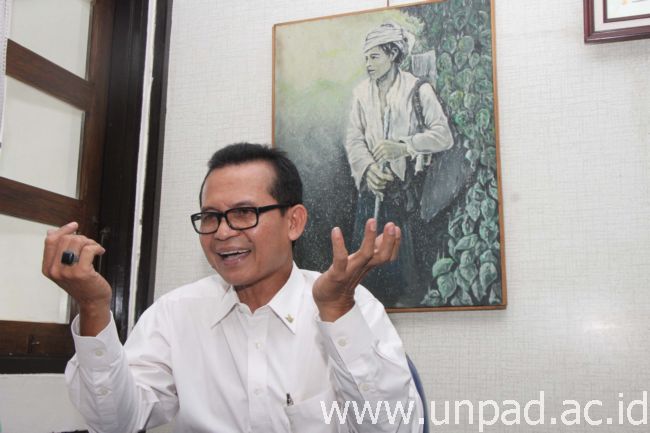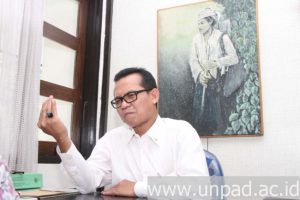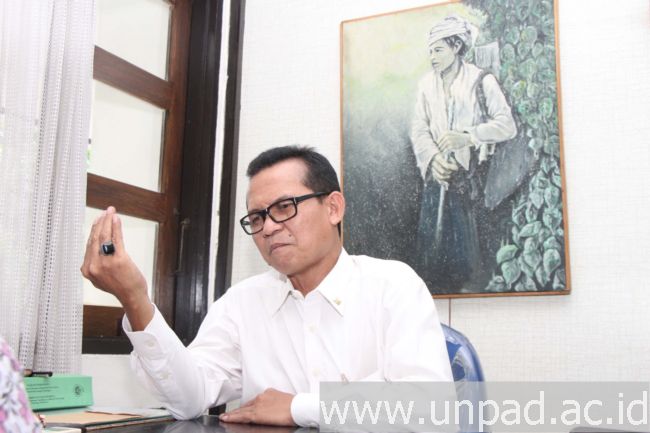[Unpad.ac.id, 13/06/2016] Sundanese identity should not only be presented in form of physical appearance of traditional clothing, or other external cultural symbols. Various values of life that have been passed on by our ancestors should become substance Sundanese identity and serve as guidelines for Sundanese people.

“Much more important is the substance of Sundanese. As silih asah, silih asih, silih asuh, these values should be the base of our way of thinking,” said this Lecturer of Sundanese Literature Faculty of Arts (FIB), Universitas Padjadjaran, Dr. Undang Ahmad Darsa, M.Hum.
Some of these values were implicitly included in Sunda ancient manuscripts. Dr. Undang explained that through philology the development of the culture of a society were studied through concepts among the ideas contained in the written tradition, especially the manuscripts.
“So, studying the manuscript was not merely copying, compiling, and then presenting the new readings. It is much much more than that,” said the Head of Sundanese Literature Study Program FIB Unpad.
According to Dr. Undang not all elements or cultural products possessed indigenous values. By studying ancient texts, we can study the implied indigeneity and the local intellectual values highlighted within.
“Thus, indigeneity might not be effective is the supporting fellow are not strong intellectuals. Local intellectuals are what we should produced through high school and university to respond to and implement the values,” he said.
Dr. Undang also mentioned ancient texts as “a product of intellectuals who were born through formal institutions of education at each of their time”. The man who was born in Tasikmalaya October 19, 1962 believed that manuscript writers are not arbitrary persons; they were intelligent people.
“If there’s a manuscript, there must be someone who wrote it. My question is wehre did these people coming from? As it turned out, it was the ‘mandala’ that became the formal institutions of education at the time of the monarchy, and pesantren (boarding school) was the formal institutions of education at the time of the empire system, “said Dr. Undang.
He was interested in discovering the site of ancient Sunda kings formal education. Dr. Undang believed that Sunda kings were educated people. According to him, there has not been many researchers who study this subject.
“At the time of the royal government system, formal educational institution was the mandala. In other words, Mandala served as formal educational institution in the Sunda Kingdom at the time of the monarchy. In chronic lontar of Ancient Sunda (XV-XVI centuries AD) it was recorded that there were 73 mandalas in Tatar Sunda, from Ujung Kulon to East boundary Kingdom of Sunda, Cipamali, “he said.
 The term of further learning was also called the “tapa“. In contrast to the notion of “tapa” at this time, which many people relate to magical activity, “tapa” has a definition of ‘study’. Dr. Undang explained that the tapa activity was carried out in an educational institution, namely in the mandala.
The term of further learning was also called the “tapa“. In contrast to the notion of “tapa” at this time, which many people relate to magical activity, “tapa” has a definition of ‘study’. Dr. Undang explained that the tapa activity was carried out in an educational institution, namely in the mandala.
“Then, mandala became the place for meditation, while tolabul knowledge happened in pesantren. Now Unpad is basically a place for meditation or tolabul knowledge,” he added.
Various researches related to Sunda ancient manuscripts has been conducted by Dr. Undang since his undergraduate study in the Department of Regional Literature (Sunda) Faculty of Letters Unpad. He then gained his Master and Doctoral degree from Unpad Postgraduate Program, exploring the science of Philology.
Dr. Undang was interested to learn Sunda-ness knowledge. Not just about the language, but about the way of life of the Sundanese of how they set up a system of governance system, the ordinance in synergy with the environment, how the development of culinary and fashion techniques, how they live their daily religious life, and so forth.
Currently, Dr. Undang aspired to realize his dream of building a laboratory of ancient manuscripts Sunda in digital form. Laboratory of digital manuscript is expected to contribute in helping other researchers in the study of ancient Sunda manuscripts without having to visit the location of the discovery of the manuscript. Digitalization is also necessary to ensure that these texts can be maintained properly and not easily damaged.
According to him, Unpad is one who discovered Sunda manuscripts. The Sunda manuscript is one the tangible cultural heritage or cultural heritage that is both in form of material culture and also contained text that can be categorized as one of the intangible cultural heritage or cultural heritage immaterial culture.
“It is our obligation in Prodi Sunda Literature to record, inventories, make note, digitize, and at the same time, reveal the examined content of the manuscript, while supported young students who show interests of it,” he said. *
Reported by Artanti Hendriyana / eh
